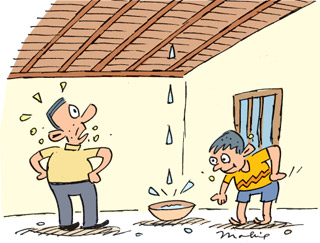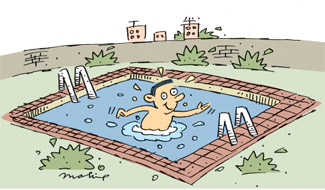|

by R. S. Karunaratne
'Still' has many uses
'Still' can be used as an adjective or adverb.
1. We use 'still' to say that a situation continues to exist at or up
to a particular time.
Grandmother is 80, but she still cooks our meals.
|

The roof is still leaking. |
The tea is still hot. How can I drink it?
She is still unemployed and her parents are worried about it.
Behave yourself. You're still a child.
I'm still learning how to swim.
2. We use 'still' to say that there is no change in a situation in
which a change is expected.
The computer still isn't working.
The postman still hasn't arrived.
The actors still aren't ready.
You still haven't started writing.
I still didn't get my promotion.
3. We use 'still' to emphasize a difference.
All my sisters have got married, but my brother is still a bachelor.
The train got crowded still more at each station.
I've finished my essay, but you're still writing.
All your friends have gone home, but you are still here.
I am 70 but I still learn.
4. We use 'still' to say that what you've just said is not really a
problem.
I do not get a substantial salary, still I'm happy.
He is partially blind, still he does a lot of work.
You're a big liar. Still I like you!
As a vegetarian I find it difficult to find a place for my meals.
Still I can manage with what is available.
5. We use 'still' as an adverb with continuous verbs.
Wait, it's still raining.
Are you still learning English?
I'm 75, but I'm still working.
The roof is still leaking.
My baby is still sleeping.
We are still swimming.
6. We use 'still + not' with the present and perfect tenses.
|

I’m still learning how to
swim. |
I still haven't written my essay.
It is 11.30 a.m. and the postman still hasn't arrived.
7. We use 'still' with 'even if' or 'even though'.
Even though you're an adult, you still need a pass to enter.
Our college is still attractive, even if it is a bit small.
8. Set phrases
There are still two months to go before the examination. (remaining)
I don't like my new job but it's still early days. (too early to know
what will happen).
Know your idioms
Idioms are colourful and fascinating expressions in English. They are
used both in formal and informal English. Here's a quiz to test your
knowledge of English. Tick off (a), (b) or (c) to match the given idiom
and its meaning. Check your answers with the key.
1. A: Do you remember the World War I?
B: No, that took place before my time.
(a) long ago
(b) before I came here
(c) before I was born
2. He can't do this job. He's a real space cadet.
(a) bore
(b) crazy person
(c) fool
3. The moment of truth came when I had to decide whether to go abroad
or to remain here.
(a) The time to remain silent
(b) The time to make an important decision
(c) The time for action
4. "Don't treat me as a figure of fun," she shouted.
(a) a stupid person
(b) a brilliant person
(c) a sophisticated person
5. In the good old days, grandfather used to tell us stories.
(a) In the past when life was better
(b) during our kings' time
(c) when foreign powers were ruling us
6. Land prices will never fall through the floor.
(a) increase
(b) become very high
(c) become very low
7. I don't think he's really sleeping. He's playing possum.
(a) dead
(b) pretending to be sleeping
(c) fast asleep
8. Leather jackets are still de rigeur for young men.
(a) outdated
(b) fashionable
(c) in demand
9. I want to die with my boots on.
(a) while actively involved in work
(b) while fighting
(c) in my retirement
10. Some workers are sure to get the axe this year.
(a) lose their jobs
(b) get their promotions
(c) get salary increases
********
Key
1. (c), 2. (b), 3. (b), 4. (a), 5.
(a), 6. (c), 7. (b), 8. (b), 9. (a), 10. (c)
********
Starters
Personal pronouns as subjects and
objects :
Pronouns are words used in place of nouns. This is done to avoid the
repetition of the nouns.
|

The principal wants to see you and me.
|
This is Suranga Silva . He is my teacher.
Anne and I are pen-pals. We have never met each other.
Malini is an actor. She is contesting for a higher position.
Note: In modern English many people prefer the term 'actor' instead
of 'actress' which is regarded as sexist or belittling. In the UK, US,
and India 'actor' is widely used.
Saman, Herat and Samson observe 'sil' on poya days. They are my
classmates.
The pronoun must agree with the noun in number. In other words,
singular pronouns replace singular nouns and plural pronouns replace
plural nouns.
Max Perera taught me English. He was a great teacher.
Shyama is just 16. She is not an adult.
Prema and Renuka are journalists. They always travel together.
Mother and I collect stamps. We have a large collection.
Pronouns used as the subject must be in the subjective form. Pronouns
used as the object must be in the objective form.
Peter and Silva are carpenters. I asked them to make a cupboard for
me.
Dilhani is my sister. I asked her to wait for me at the railway
station.
We are looking for part-time work. Can you give us some work?
I am a serious student of English.
He asked me whether I could write an essay on "The value of sports".
We use pronoun or noun + and + I in subject position.
Ursula and I play tennis everyday.
Note: You cannot say, "I and Ursula".
The principal wants to see you and me.
Note: You cannot say, "me and you".
Memory aids
First person (the speaker): Singular "I"
Plural "We"
Second person (the person spoken to)
Singular and plural: you
Third person (the person or thing spoken about) Singular: He, she, it
Plural: they
New trends
"They" used in conjunction with 'anyone', 'everyone', 'no one' and
'someone', is, increasingly replacing 'he' or 'she', although to do so
is ungrammatical.
The reason for this is to avoid the sexism of using 'he' when the sex
of the person is unknown. "He/she" or "He or she" are clumsy
constructions. So, you can say, "Every one must fill their forms. |

